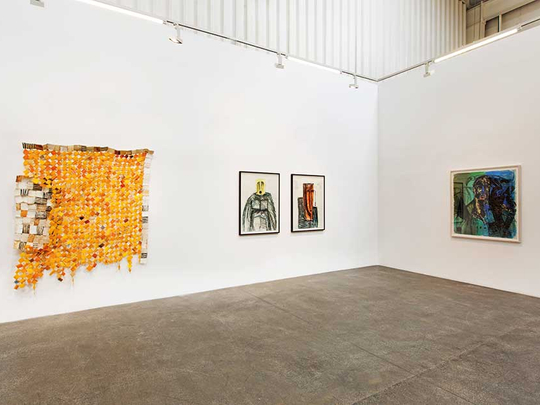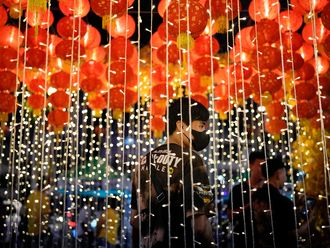
In an interesting initiative Lawrie Shabibi gallery has invited Gallery 1957 from Accra, Ghana to ‘takeover’ its space in Dubai for a few weeks. Although this initiative is a first in this region, it follows a worldwide trend for younger galleries to develop their programmes internationally through the pooling of resources.
“This ‘gallery takeover’ is an exciting experiment for us and will provide the local audience with something fresh. Next year we hope this will expand into the entire gallery community in Dubai inviting other international galleries into local spaces,” Asmaa Al Shabibi, co-director of the gallery says.
Gallery 1957 was established in 2016 in Accra by British-Lebanese collector Marwan Zakhem and focuses on contemporary West African art. It is presenting a solo show, Displaced, by Ghanaian multi-media artist Serge Attukwei Clottey who is interested in exploring migration through the movement of human beings and objects. The show features a series of pastel drawings on paper, Clottey’s signature sculptures made from pieces of yellow gallon containers, and a video.
Clottey’s large figurative drawings, mostly featuring women, have a distinctly cubist look, strongly reminding viewers that the original inspiration for cubism came from traditional African art. Through the distorted and fragmented figures in his drawings the artist addresses contemporary socio-political issues such as the dreams of Africans to migrate to the West, the dangers and disappointments they face in this quest for a better life, the corruption in politics, and the role of women in society. Other works tell personal stories such as the artist’s experiences of racism and cultural discrimination during his travels in the West.
Clottey is well known for using the yellow plastic gallon containers seen everywhere in Ghana to make interesting sculptures. He cuts the cans into pieces, cleverly using the part with the mouth and the handle to make human masks, or linking the pieces with wire to create mesh-like sculptures that tell stories about what is happening around him. For instance, in a work titled Social Experiment he has recreated the landscape of his town, showing how new real estate developments are taking over poor neighbourhoods and green spaces.
“These plastic cans originally contained cooking oil, chemicals and other items exported by the West. But they are reused as containers for water and other liquids and hence are ubiquitous in Ghana. So, each piece of yellow plastic in my sculptures carries layers of memories and the traces of the hands it has passed through and places it has been to. I sometimes paint on the pieces lines mimicking the barcodes on the cans that identify the country they came from, to remind viewers of the object’s original identity and displacement,” Clottey says.
He began using the cans 15 years ago because he found them littering the streets and beaches everywhere. But his whole community is now involved in collecting these found objects for him.
“It is unhygienic to reuse these containers for drinking water or food, and the plastic is polluting our environment. So, using this material for my work has turned out to be good for my community. And it is a way of upcycling this waste and sending it back to the West in the form of valuable art so that Africa can benefit from the migration of the object,” Clottey says.
The video, titled Displaced tells the story of the Clottey family’s migration through an enactment by the artist and his performance collective GoLocal. The film features many symbolic elements such as pieces of broken boats carrying family and village markings, Clottey’s plastic can sculptures and fishing nets that tell a poignant story of displacement, loss and longing to belong.
“My family were traders of beef and alcohol, which they carried in yellow gallon containers. They sailed along the coast selling their goods on the shores of coastal towns, and the good relationships they developed with their customers led them to move to another town. This was an internal migration for reasons of trade, but through this personal story I wanted to explore the global story of migration of human beings and objects,” the artist says.
Jyoti Kalsi is an arts-enthusiast based in Dubai.
Displaced will run at Lawrie Shabibi gallery, Alserkal Avenue, until March 3.












